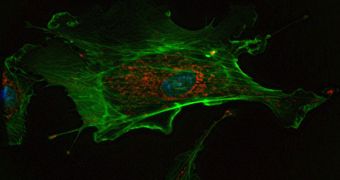Given that more and more countries are banning animal testing, pharmaceutical and cosmetic companies are looking for alternative systems to use in their research. A new study demonstrates that it is possible to use artificially-grown human cells for this very purpose.
If the proposal is validated, then this would eliminate the need for a very large number of animals that are currently required to test whether a cosmetic product will cause an allergic reaction, or if a certain new drug is causing sensitivity or other side-effects when administered.
Until now, testing for such things has been done on animals. However, in more recent time, companies have been prevented from doing so by activists. As such, they need a new platform for testing their products, and synthetic human cells may be precisely what they need.
Although the initial investments in maturing this technology would be rather expensive, the upside is that the tests themselves would be conducted on actual human cells, not a proxy belonging to another species. In other words, the results would be more applicable to the real world.
Details of the new proposal were published in the latest issue of BioMed Central’s open-access scientific journal BMC Genomics. The cells researchers are proposing for use can classify chemicals as sensitizing or non-sensitizing, and are also capable of determining the intensity of allergic reactions.
“REACH (Registration, Evaluation, and Authorization of Chemicals) regulation requires that all new and existing chemicals within the European Union are tested for safety,” explains profesor Carl A,K, Borrebaeck, the director of the CREATE Health program at the Lund University, in Sweden.
“The number of chemicals this includes is over 30,000 and is increasing all the time. Our lab-based alternative to animal testing, although in an early stage of production, is faster, out-performs present alternatives, and, because the cells are human in origin, is more relevant,” he goes on to say.
“It provides a way of ensuring the continued safety of consumers and users and, by identifying chemicals and products with low immunogenicity, reducing the suffering due to eczema,” he adds.
In order to measure the body's response to known or new chemicals, the investigators are using human myeloid leukemia cell lines. By genome-wide profiling, the team can determine how these cells produce biomarker signatures of the chemicals they are exposed to.
Thus far, the team managed to obtain the signatures – and potential side-effects – of several chemicals, and are now in the process of constructing a comprehensive database of available drugs, AlphaGalileo reports.

 14 DAY TRIAL //
14 DAY TRIAL //